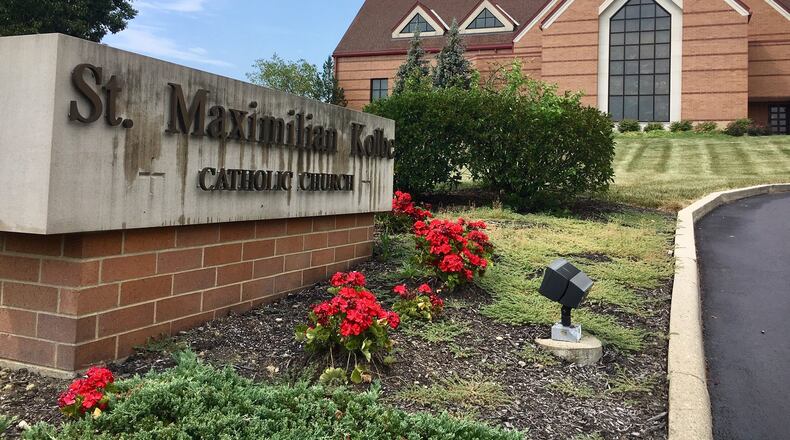FCC Pastor Brian Schreiber added, “Some people wore masks because they had to. Others did it even though they didn’t want to because they wanted to be there. Making sacrifices to care and love for another person is very Biblical.”
Easter 2021 is symbolic for a couple of reasons. Besides the obvious religious significance, Easter 2020 hammered home the reality of the pandemic, with one of the biggest and holiest services of the year performed to a vast, empty room in many places. Now, after a year of restrictions and improvisations, local churches are looking to Easter as a milestone for things getting back to normal.
“We’re excited to be under one roof again, even if it’s with less people,” said Sarah Merkel, Pastoral Associate for Communications at St. Maximilian Kolbe Parish in West Chester. “We’re filling the holy water fount for the first time in over a year. We’ll be able to have some music – one flute, one trumpet – but not as much as always. But we’re excited about having our Saturday night vigils, where we welcome new converts.
“We’ll be able to bring the choir back for Easter, though they’ll have to sing through masks. I’ve heard other choirs do it. I don’t know how they do it, but it sounds great. My standards may have lessened throughout the last year.”
Unlike many churches, the FCC made a decision to pre-record sermons instead of livestreaming.
“We didn’t want it where you’re basically watching church happen,” Staudenmeier said. “We’ve seen a lot of bad livestreams, and we knew what it took to make a good one, and we just didn’t have the resources. Pre-recording gives us a lot more control over the quality, lets us fix technical issues. Brian does those in a living room setting instead of preaching from a stage, and it’s a lot more intimate, where he’ll say something like, ‘Hey, I know you’re in your pajamas. Let’s talk.’”
The recordings are released at 10 a.m. every Sunday, continuing even after the FCC started in-person services again last June.
Thanks to St. Kolbe’s size, its limited capacity is more than can squeeze into most other churches. Merkel said the mental states of the St. Kolbe congregation is “up and down.”
“Half of people want to do Bible study in person, half don’t,” she said. “We have to acknowledge the comfort level for both groups. Some people say we should do more, that we’re too strict. People get passionate about faith. We’re not just a sports club. Fortunately, we’ve stayed engaged with each other, and many people join virtually. You can get mass at a lot of places online, with national productions that are better than ours. People are choosing to stay part of our community.”
It wasn’t just the parishioners themselves chafing under COVID-19.
“We use Zoom for a lot of our meetings, like for student ministry,” Staudenmeier said. “In a lot of ways, it made our meetings more efficient. There was less goofing around. But after awhile, you feel the limitations of the virtual life.”
Both Merkel and Staudenmeier said that, unlike most nonprofits and businesses in America, they didn’t bear a substantial financial hit.
“We publish our numbers and our parishioners have been generous,” Merkel said. “We’re actually budgeted higher than usual right now. Our expenses have been lower because we’ve been doing less.”
“Money was one of our biggest concerns,” Staudenmeier said. “We started an online giving system. People were still big on coming in and dropping off a check, or mailing it. We’re working on a fundraiser to pay down our building.”
Added Schreiber, “We have to have the money raised by August 2022. We’re already over halfway there.”
Nobody knows for sure when the pandemic will officially end. Merkel and Staudenmeier have the path of cautious optimism.
“The weather is warming up and the grass is getting greener,” Merkel said. “I’m from Southern California, I’m used to the same weather all year, so the magic of spring never ceases to amaze me, but this year feels particularly hopeful. There’s a sense of hope in the air.”
“We’re doing some planning ahead,” Staudenmeier said. “Our guiding principle is that whatever we do, we’ll do it slowly. There will be no sudden, drastic changes.”
Added Schreiber, “There are people who will want to be cautious, and we don’t want to make a problem for them.”
“If we’ve learned one thing,” concluded Staudenmeier. “It’s that Jesus taught us not to worry about tomorrow because each day has enough trouble of its own.”
About the Author
